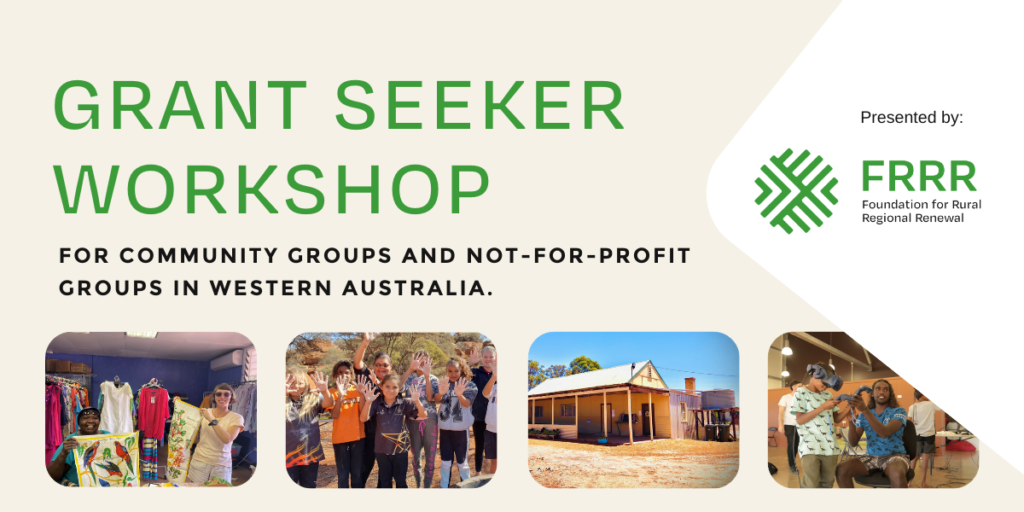Foundation for Rural & Regional Renewal (FRRR)
FRRR has awarded another $286,318 in grants to four Leeton not-for-profit organisations (NFPs), in partnership with the Vincent Fairfax Family Foundation (VFFF). These grants will continue to build the capacity and sustainability of NFPs in the Leeton area, allowing them to better support their community.
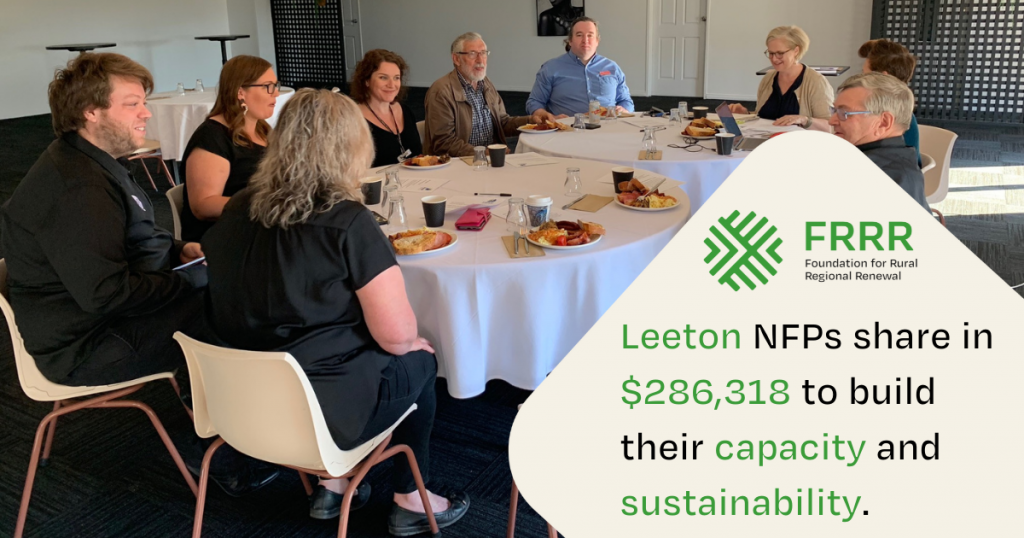
The grants are part of FRRR’s Investing in Rural Community Futures (IRCF) program – an ongoing multi-year program that works to strengthen the NFP sector and inter-organisational relationships in Leeton, helping the community to thrive and achieve long-term stability.
As part of the IRCF program, FRRR facilitated sessions with community groups to create Roadmaps to document the organisational needs that exist in the Leeton NFP community and how FRRR can support local NFPs to maximise opportunities for a stronger and sustainable NFP sector and community.
Nancy Sposato, IRCF Program Manager for Leeton, said that each of the four initiatives being funded meets a need outlined in the Leeton Roadmap.
“The applications we received confirmed what we saw in the results of the FRRR’s recent Heartbeat of Rural Australia study, which showed, overwhelmingly, that after nearly two years of constant disruptions, volunteers are fatigued. In fact, many organisations have lost their volunteers due to the impacts of COVID-19.
“This round of grants will see new and continued employment of people for Leeton NFPs, taking pressure off volunteers and allowing these organisations to continue building resilience and capacity and doing what they do best – providing vital support for their community.
“A real strength of the IRCF program is that it provides a framework for these local NFPs to collaborate and support one another while also playing to their individual strengths. We can see such a sense of community in this round of applications, with intention for almost all of the roles funded through these grant funds working from the Leeton Connect offices. This will give the broader sector much greater access to their capacity building services.
“We’re also pleased to be funding a Leeton Jumpstart Coordinator who will oversee mental health first aid training. This training will be delivered to the Leeton Jumpstart Fund assessors, as well as members of the wider NFP sector. It’s these kinds of inter-organisational initiatives that will have a widespread impact on the entire Leeton community,” said Ms Sposato.
The four funded initiatives are:
- Leeton Business Chamber – Leeton Community Digital Hub Initiative – Support the not-for-profit sector and develop, build and engage the community in a new Digital Hub for Leeton. $40,000
- Leeton Connect Inc – Leeton Continues to Connect – Build capacity of the not-for-profit sector across Leeton and develop a plan towards a secure future by continuing to employ the coordinator for Leeton Connect over a two-year period. $147,600
- Leeton Jumpstart Fund Incorporated – Leeton Jumpstart Coordinator – Build capacity in fundraising, marketing and the delivery of mental health first aid training for Jumpstart’s volunteer panel and other local NFPs dealing with crisis through the employment of a coordinator. $44,718
- Leeton Shire Council – Community Grants Support Coordinator – Help not-for-profits in Leeton apply for and strengthen their own capability to attract funding and resources by employing a Grants Support Officer. $54,000
In addition to Leeton, the IRCF program is also working in Junee and Nambucca Valley in partnership with the Vincent Fairfax Family Foundation, and in Nowra, Batemans Bay and Ulladulla with the support of The Snow Foundation, and in Bay & Basin in partnership with Bendigo Bank Community Enterprise Foundation.
For more information about the Investing in Rural Community Futures program visit – https://frrr.org.au/ircf-program/.
Having worked at a community level for 5 years now, most recently as a Program Coordinator and Community Development Officer for Blackall Tambo Regional Council, Jaimee-Lee Prow has experienced first-hand the generosity and good intentions that relief agencies have when it comes to drought in remote, rural, and regional communities. However, these good intentions often don’t translate into practical and accessible support at a grassroots level. Here she shares her story.
To paint a picture of what I mean, I’ll explain a bit about what our experience has been with relief agencies within the central western Queensland drought space. Off the top of my head, I can name at least 20 organisations that offer much the same kind of assistance. This overlapping service provision is driving a state of competitiveness among these organisations and, from a community perspective, has led to a matrix of issues that prevent community groups from taking them up on their offers of assistance. This, on top of a disconnect at a community level, has meant that these relief organisations are actually hindering themselves from reaching the goals that they set out to achieve.
We rural people are a stoic breed. This over-supply of relief support has led to a lot of miscommunication, confusion, and apprehension, resulting in people abstaining from seeking assistance. Or else people become overwhelmingly confused about how to navigate the many systems with most deeming it as an added stress that they simply don’t need. Another familiar scenario is that of individuals, community groups and local-not-for-profits who don’t apply for assistance through one organisation because they’ve already applied for similar assistance through another organisation, and they fear that it will be seen as ‘double dipping’.
Beyond the confusion and burdensome processes, rural communities often feel that these relief agencies fail to properly consider the demographic that they’re dealing with. A large portion of our graziers, primary producers, small business owners and community members are over the age of 65 years with many of them either being extremely hesitant about social media or else completely oblivious to it. Yet, many of these relief organisations use social media as their main tool for promotion and one of their primary platforms for getting information out there. It’s also common that applications for grants will exist predominantly online and even requests for assistance are virtual. As a result, a large portion of our drought impacted population are missing out on the valuable financial assistance offered by the relief agencies. So, a word of advice – this generation still rely on good old-fashioned word of mouth, and mainly prefer to trust “the local bloke”.
Charities, not for profits and non-government organisations can take action to shift from their traditional roles as relief agencies and move towards becoming partners who walk in lockstep with resilient and prepared communities. These relief agencies are, of course, well-meaning but most, if not all of them, are based outside of our region. Some of them even have a strictly virtual presence. Which is why, despite the obvious devastation of drought that surrounds us, they often walk away scratching their heads at the low levels of relief uptake after briefly popping up in our communities. The lack of local coordination and sharing of information on the ground is, ultimately, failing our rural communities.
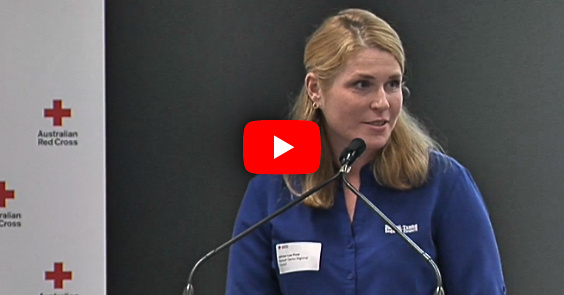
So, how do we fix the problem?
The solutions aren’t necessarily innovative or complex. In fact, they’re quite simple. Below is a list of steps that relief agencies can take to provide effective support to our drought effected communities:
Step one: listen to the locals
As mentioned in the Red Cross Drought Resilience discussion paper, projects and program delivery from organisations need to be locally focused to meet the needs of the region they are working with. When it comes to providing assistance for our communities, blanket approaches simply don’t work and a ‘one-size-fits-all’ solution doesn’t exist.
Step two: we need more than just a plan for the future
We are really at a critical point within the community drought recovery process where we need to keep the momentum going and continue to create or maintain partnerships. Within my local community. I have recognised a shift away from the initial panic and knee jerk reactions to the disaster. Local individuals, groups, businesses, and farms are now ready to accept and explore actions they can take to prepare for future drought- something that wasn’t possible in the initial stages of drought response.
Our initial response was to flood funds upon our drought impacted communities. And this was evident in the amount of overlapping we saw in service provision from our relief agencies. Don’t get me wrong, to a degree we certainly needed it. But what we are starting to see or recognise now is that drought funding is starting to dry up, and services are beginning to wind back in our rural communities. This imbalance between community readiness and resources, and the funding now available is a major concern moving forward. In the disaster recovery and planning phase, we need the resources now more than ever to be ready for next time.
Step three: simple applications and greater flexibility
We need to ensure application processes are simplified and easy to access. This will benefit all sections of the community but is crucial if organisations want their programs to be accessible to applicants aged 65+. Secondly, because each region is different, the criteria grants need to be made more flexible so that projects can be locally defined by the communities themselves and can be used to support a cross section of activities such as infrastructure, events, training, capacity building and network development.
Step four: recognition of the role that local organisations play
Local organisations are the backbone of remote, rural, and regional communities. Therefore, programs need to be modelled around their goals and needs. In order for partnerships to be successful and meaningful to our communities, agencies must be personable within the community, and the program itself must be driven by the community that the agency is working with.
During my time working at Blackall Tambo Regional Council, I have worked closely with FRRR on a number of drought resilience initiatives. FRRR have championed solutions that have been led by our community and that are driven by the needs and abilities of those living in our region. I believe that this approach to disaster recovery is the way of the future.
Step five: events and projects should be led by trusted locals
This is the valuable way to connect, respond, recover and plan ahead. While some are of the belief that the community barbecue or the local arts and cultural workshop are a band-aid solution to relieving the impacts of drought, those from rural communities would actually beg to differ. We come from significantly isolated areas. These types of community events, particularly during drought, are a necessity for creating touchpoints, social check ins, networking opportunities, and they keep our communities connected.
Some of the most brilliant ideas for future proofing and planning are sprouted through general chitchat amongst like-minded people at these types of events. We are already seeing some relief organisations which have come into our region, begin to recognise these events and spaces as the perfect platform for informal networking and building a rapport with our community members. As a result, partnerships have become stronger, and we find that these organisations who take these extra steps have a better understanding of our community’s needs which results in a greater uptake of their services.
Step six: continued government and philanthropic support
As I’ve already mentioned, it’s crucial that relief agencies don’t simply pull the plug and let funding dry up. Our rural communities are now more than ready than ever to prepare and build resilient regions through planning and projects. We just need the continued commitment to fund and provide resources.
Step seven: build local champions
As an NFP, charity and non-government organisation you should be an active collaborator, but you should essentially be led by locals. Start building your local champions in the communities you were working with. They will be your best investment.
Finally, I’ll finish with something I heard once that I believe perfectly sums up the attitude we must approach the future with if we’re going to continue to build prepared and resilient communities: “You don’t need to be strong to survive a bad situation. You just need a plan.”
Nearly $700,000 in funding awarded to local community groups
Funding announced by FRRR today, is helping local community groups in Junee and Nambucca Valley to carry on their operations, despite multiple disruptions, by funding staff, developing efficient processes and boosting their capabilities through collaboration and technology.
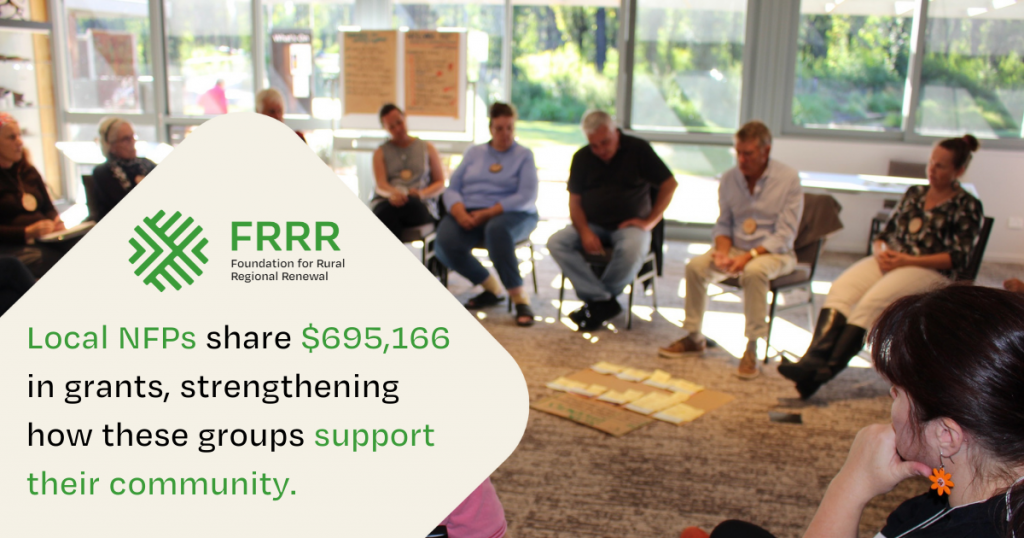
Fourteen local not-for-profits (NFPs) are sharing $695,166 in grants, which will strengthen how their organisations function, and bolster the ways in which these groups can support their communities.
Funded by FRRR, in partnership with Vincent Fairfax Family Foundation (VFFF), Investing in Rural Community Futures (IRCF) is a five-year program designed to provide local NFPs with the tools and support they need to make lasting impacts in their areas of focus for the community. As part of the program, FRRR worked with the groups to create a tailored NFP sector roadmap, reflecting their shared goals. This funding and other ongoing support, including local facilitators on the ground, is helping bring these plans to life.
Nancy Sposato, FRRR Program Manager, said that the IRCF program, now in its third year, gives participating not-for-profits the opportunity to identify common issues and develop local strategies that will support their long-term sustainability.
“Through these grants, we have supported six organisations we’ve previously funded, alongside eight new organisations. This package really shows a deeper understanding and sophistication in how organisations are approaching capacity building,” Ms Sposato explained.
“At this point in the program, it is fantastic to see collaborations and sector alliances building within each community. A great example of this is support for Unkya Local Aboriginal Land Council in the Nambucca Valley, who will deepen First Nations NFP sector collaboration and support key leaders to develop a cultural-competency induction package.
“Local employment continues to be a key capacity building measure in supporting stability and sustainability, particularly considering COVID related disruptions. For example, Junee Business and Trades will be able to employ a part-time grants officer, which will make it easier for local NFPs to apply for funding to support local projects. These grants also respond to the need for technology system and small-scale infrastructure upgrades, further enhancing organisational efficiency.
“We look forward to continuing to work with Junee and Nambucca Valley NFPs, and continuing to support them as they implement their unique roadmaps,” Ms Sposato, said.
In addition to Junee and Nambucca Valley, the rural community of Leeton is taking part in the VFFF-funded IRCF program. FRRR has also partnered with The Snow Foundation to expand the program into the Shoalhaven communities of Batemans Bay, Nowra and Ulladulla. In June, FRRR partnered with Bendigo Bank’s charitable arm, Community Enterprise Foundation to further expand the IRCF program into the Bay and Basin region.
For more information about the Investing in Rural Community Futures program visit – https://frrr.org.au/ircf-program/.
The full list of grant recipients and their projects are below.
| Organisation | Project | Grant | ||
|---|---|---|---|---|
| JUNEE | ||||
| Junee Business & Trades Incorporation | Appoint a Grants Officer Enable local Junee NFPs to access funding to support local projects through the employment of a part-time grants officer position. | $118,959 | ||
| Junee Community Centre Inc | Subsidy for Centre Manager Sustain the Junee Community Centre by subsidising the centre manager role to support organisational governance, partnerships, and strategy development. | $140,000 | ||
| Junee Community Power Inc | Junee Community Circular Fund (JCCF) Alleviate energy poverty by providing additional support to the Junee Circular Fund to facilitate completion of the installation of solar power to the Junee Senior Citizens Hall. | $47,508 | ||
| Junee Hostel for the Aged Inc | Modernise Aged Care for Junee | $49,706 | ||
| Regional Heritage Transport Assoc - Junee Inc | Moving the Junee Roundhouse Museum into the 21st Century Strengthen the capacity of the museum to operate more effectively with the installation of electronic software and appropriate hardware. | $25,724 | ||
| Riverina Working Equitation Incorporated | Illabo Showground Combined User Group Strategic Planning Enable the Illabo Showground's combined user group to develop a strategy for the future sustainability of the grounds. | $3,580 | ||
| NAMBUCCA VALLEY | ||||
| Bowraville Community Development Association Incorporated | Surveying the Bowraville NFP Community About the Future Use of the Pioneer Community Centre Strengthen the use of the Bowraville Pioneer Community Centre by surveying the Bowraville community organisations to determine future use. | $13,750 | ||
| MiiMi Aboriginal Corporation | Gumbaynggirr Receptionist | $54,470 | ||
| Mujaay Ganma Foundation Aboriginal Corporation | Yuraal Guunumba Ngurraay: Gumbaynggirr Native Foods Community Garden Project STAGE 2 Continue to foster community engagement, organisational capacity, and share cultural knowledge by engaging trainee coordinators and mentors to sustain the Mujaay Ganma's Yuraal Garden Project. | $31,173 | ||
| Nambucca Heads Mens Shed Inc | Exploring Energy Options Increase organisational capacity and save operational costs for community organisations by exploring the viability of using renewable energy to help sustain not-for-profit organisations in the Nambucca Valley. | $11,000 | ||
| Nambucca Valley Council | Local News Shared Strengthen the collaboration of the local community newsletter committees of the Nambucca Valley to build capability, share content and amplify the voice of young people across the Valley. | $43,292 | ||
| Nambucca Valley Phoenix Limited | Investing in Strategy - Building a Sustainable Social Enterprise Building a Sustainable Social Enterprise. Strengthen the capacity of the organisation to deliver on their new Strategy and aspiration to become a sustainable social enterprise by strengthening their brand and supporting staff. | $47,000 | ||
| ShoreTrack Ltd | ShoreTrack MOS (Management Operational System) Enable ShoreTrack Ltd to develop an internal operational management system to maximise the organisation’s capacity and operationalise their strategy. | $36,300 | ||
| Unkya Local Aboriginal Land Council | Jinda biin duguula (Sisters Together) To deepen First Nations NFP sector collaboration and to support key leaders to develop a cultural competency induction package. | $72,704 | ||
Calling all not-for-profits in rural Australia
The Foundation for Rural & Regional Renewal (FRRR) is calling on leaders of not-for-profit organisations and community groups across remote, rural and regional Australia to tell it like it is in the Foundation’s inaugural Heartbeat of Rural Australia study.
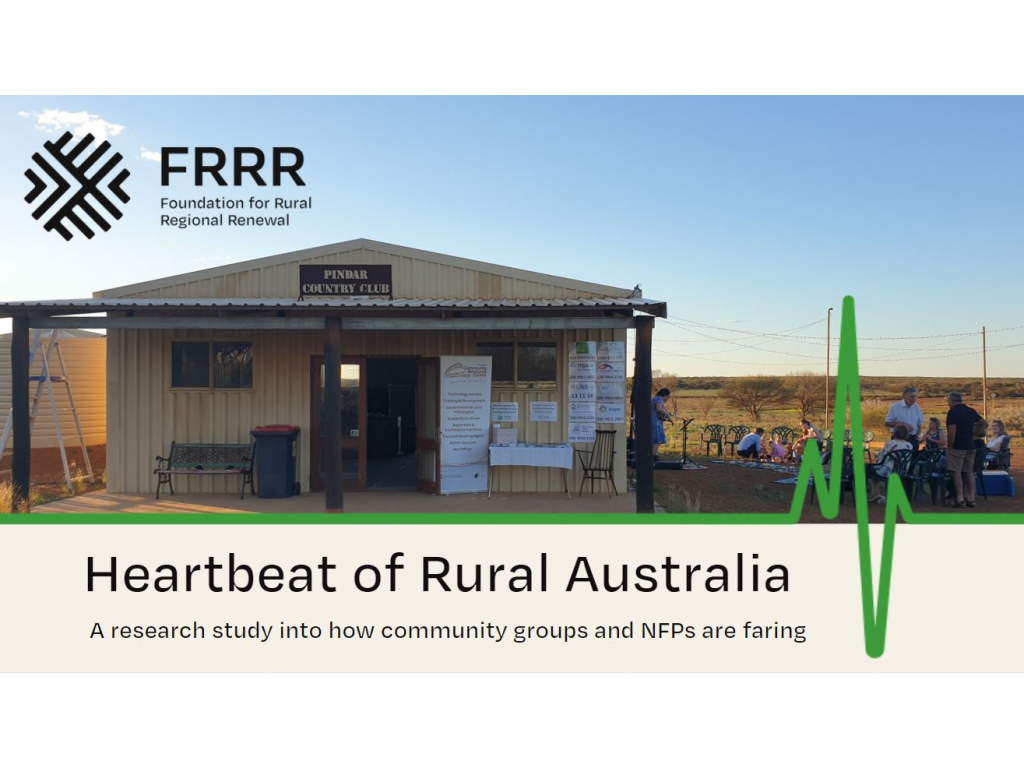
Established in 2000, FRRR is a charity dedicated to connecting the genuine local needs of remote, rural and regional people and places with the good will of government, business and philanthropy. Since 2000, FRRR has distributed more than $115 million in grants to more than 11,000 rural projects.
Working deeply in rural communities over the past 21 years means that FRRR is acutely aware of the critical role that small not-for-profit organisations and community groups play in keeping their communities vibrant and resilient.
However, Natalie Egleton, FRRR’s CEO, says that not everyone outside of these rural communities knows or understands it.
“Many organisations find it tough to keep going at the best of times, but we know that many places have been heavily impacted by drought, fires, floods, the mouse plague and the ongoing COVID-19 pandemic – often in succession – and the cumulative impacts are really significant. But how significant? What does it mean for their future?
“There is funding and support being channelled to these communities, but is it getting to the right places? Is it delivered in the right way? What exactly has the impact been of events like the bushfires and COVID on community groups? How are they getting funding to keep going? How are they resourcing themselves, given the volunteer fatigue?
“Our day-to-day work means that we know that without these volunteer-led groups, there would be a lot more gaps in the critical services that sustain remote, rural and regional communities across Australia. But because there is not really any hard data to measure the value of the work they do, and the challenges they face, it’s nearly impossible to quantify the important economic, social and cultural role of these groups.
“We have lots of anecdotal evidence to answer these questions from the thousands of grant applications we’ve seen in the last 18 months and our day to day conversations, but the reality is that is only a snapshot.
“That’s why we have commissioned this study. We need some hard data to inform policy and ensure that funding gets where it’s needed,” Ms Egleton said.
For this survey to be meaningful, FRRR needs as many local community groups as possible from remote, rural and regional communities to participate.
“We’re encouraging responses groups and organisations working with and representing the diversity of the people and places that make up country Australia to ensure we are telling as much of the story of remote, rural, and regional Australia as possible.”
The results of the study will be shared widely with government, philanthropy and business, to inform and influence policy. The report will also provide local groups with the evidence they need to successfully advocate for their community and to tell their stories.
“This survey will be a great tool to provide you and the people you live alongside, with the help and assistance that you need. So, it’s important that you make your voice heard, tell your story and help to shape the future of your community,” Ms Egleton said.
To complete the survey and share it across your community, go to https://frrr.org.au/heartbeat.
Local NFPs in Nowra area invited to have their say
FRRR is inviting not-for-profit organisations (NFPs) in the Nowra region to take part in an upcoming series of workshops to plan how the Foundation’s Investing in Rural Community Futures (IRCF) program can support them to create stronger organisations for a stronger community.
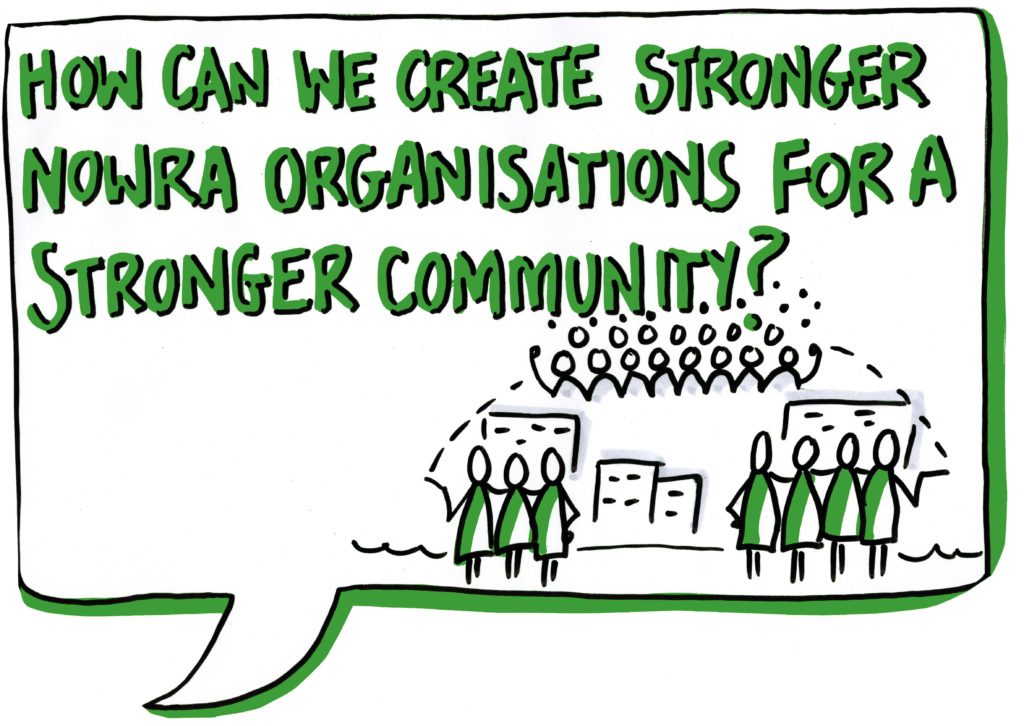
FRRR’s IRCF program is run in partnership with The Snow Foundation. Now in its second year, the five-year program is designed to strengthen local NFPs on the South Coast through localised support, resources and funding, so they can make lasting impacts in the community.
Called “Community Roadmap” (CR) workshops, these sessions will allow NFPs in the Nowra region to come together and map out how they will leverage the funding and support of the IRCF program over the next four years to maximise opportunities for long-term sustainability.
Kate Dezarnaulds, FRRR’s IRCF Program Coordinator, said that the workshops will look to the future, helping Nowra NFPs uncover shared goals and challenges, as well as offer a safe space for participants to reflect on and share the considerable challenges of the past year.
“These workshops are the next stage in the IRCF program. They are a great opportunity for local NFPs to come together and celebrate their resilience, as well as aid collaboration and sharing of resources,” Ms Dezarnaulds said.
“As a result of these Community Roadmap workshops, the Nowra NFP community will have a list of priority projects that the IRCF program can then support over the next four years with grants and expert advice.
“The Community Roadmap is likely to uncover shared goals and needs such as strategic planning, governance training, digital marketing, finance advice and support, and additional resources to support innovation, sustainability and recovery.
“We are working with expert local facilitators, Campfire Coop, and invite a wide range of representatives from local NFPs in the Nowra region, including those not currently funded through the IRCF program, to come along to the workshops and have their say,” Ms Dezarnaulds said.
FRRR also announced $83,000 in funding for three projects in Nowra as part of the program’s initial Start-Up Grants. These projects will help to support and connect the community to respond to the challenges of 2020. In total, nine projects have already been funded through the IRCF program, thanks to the generosity of The Snow Foundation.
Nowra Community Roadmap workshops
Community leaders are invited to come along to either the day or evening session.
| When | Day session: Tuesday 1 June, 9.30am-3.30pm (lunch provided); or Evening session: Wednesday 2 June, 5-9pm (light meal provided) |
| Where | Day session: Nowra School of Arts Evening session: Bomaderry Bowling Club |
| How | Day session: Bookings via link Evening session: Bookings via link |
Nowra Start-Up Grant Recipients
- Pathways Foundation Ltd – Pathways Foundation – $30,000 – Accelerate the implementation of a new COVID-adapted and localised strategic plan with seed funding for the appointment of a community development officer.
- South Coast Women’s Health and Welfare Aboriginal Corporation (trading as Waminda) – Waminda’s Social Enterprise Initiatives – $23,000 – Strengthen the financial sustainability of Waminda while developing the skills and confidence of Aboriginal women to secure employment, through the implementation of a business plan for three social enterprises.
- Noah’s Inclusion Services – Enhancing the strength, effectiveness, and longevity of the Noah’s Inclusion Services workforce – $30,000 – Rejuvenate the pipeline of available allied health care workers and support succession planning for Noah’s leadership position s through a coaching program and a long-term student placement partnership with the University of Sydney.
See the funded Nowra projects already underway here.
For more information about the Investing in Rural Community Futures program in NSW South Coast region visit – https://frrr.org.au/funding/people-grants/investing-in-rural-community-futures-nsw-south-coast/.
UPDATE: Workshop recording is available to watch below:
WA community groups and not-for-profit organisations invited
Community groups and not-for-profits across remote, rural and regional Western Australia are invited to attend a free online grantseeker workshop, hosted by the Foundation for Rural & Regional Renewal (FRRR) on Thursday 25 March, from 10:30am to 12:30pm (AWST).
The workshop will highlight FRRR’s grant programs and provide grant-writing tips to help community groups become more confident in applying for any of FRRR’s grant programs. This includes the Tackling Tough Times Together (TTTT) program for communities in drought, and the Strengthening Rural Communities (SRC) program, which is highly flexible and supports a broad range of community needs.
Recent WA communities to benefit from TTTT and SRC grants include Esperance, Leonora, Exmouth, Broome, Carnarvon, Quairading and Aldersyde. These grants funded a wide range of locally-led projects including initiatives designed to enhance community wellbeing and resilience, boost local tourism and assist in economic renewal.
FRRR connects goodwill with good purpose for the vitality of remote, rural and regional Australia. As the only national foundation specifically focused on ensuring the social and economic strength of these communities, FRRR’s grant programs give community organisations the opportunity to access funds for a broad range of initiatives that directly benefit local communities.
Register for this free online grantseeker workshop at: https://events.humanitix.com/frrr-wa-grant-seeker-workshop.
Note: Please avoid using Internet Explorer to open this link – use other web browsers such as Chrome, Safari, Firefox or Edge. If you are having difficulties opening the link please contact the TTTT team via toughtimes@frrr.org.au.
Applications for the TTTT and SRC programs are always open. The cut-off date for the next round of TTTT is 24 May 2021. The next cut-off date for SRC grant applications to be considered is 24 August 2021.

